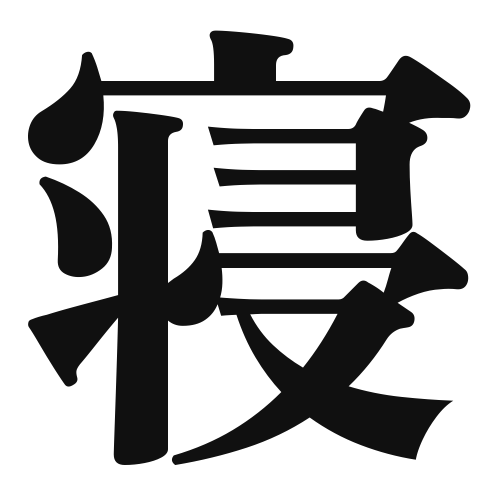1. Overview of Meaning
The kanji “寝” (ne) means “to sleep” or “to lie down.” It is commonly used to refer to the act of resting or sleeping, and it conveys a sense of relaxation and comfort.
2. Formation and Radical
Formation of the Kanji: The kanji “寝” is a phonetic compound (形声文字) that combines the radical for “to stand” (立) and the phonetic component “寢,” which relates to sleeping. This combination reflects the action of lying down.
Radical: The radical for “寝” is “宀” (the roof radical), which often relates to buildings or places where people reside, emphasizing the context of sleeping indoors.
3. Examples of Usage
Common Words and Phrases:
- 寝る (neru) – to sleep
- 寝室 (shinjitsu) – bedroom
- 寝具 (shingu) – bedding
Example Sentences in Daily Conversation:
- 今日は早く寝たいです。 (Kyou wa hayaku netai desu.) – I want to go to bed early today.
- 寝室はとても快適です。 (Shinjitsu wa totemo kaiteki desu.) – The bedroom is very comfortable.
4. Synonyms and Antonyms
Similar Kanji:
- 眠る (nemuru) – to sleep (more passive, often used for being in a state of sleep)
- 休む (yasumu) – to rest (broader term that can include sleeping but also refers to taking a break)
Antonyms:
- 起きる (okiru) – to wake up or to get up (the opposite of sleeping)
- 働く (hataraku) – to work (active engagement, opposite of resting)
5. Cultural and Historical Background
Relation to Japanese Culture: Sleep is an important aspect of Japanese culture, often associated with health and well-being. The concept of “napping” (昼寝, hirune) is also culturally significant, reflecting the value placed on rest.
Proverbs and Idioms:
- 寝る子は育つ (Neru ko wa sodatsu) – “A sleeping child grows,” meaning that children need their sleep to grow and develop properly.
- 寝耳に水 (Nemimi ni mizu) – “Water in a sleeping ear,” which means to be caught off guard or surprised by unexpected news.
